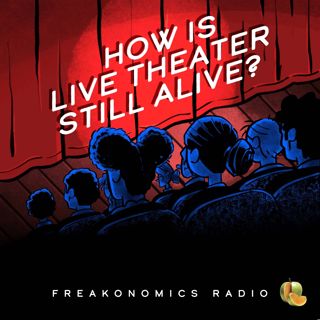
600. “If We’re All in It for Ourselves, Who Are We?”
Tania Tetlow, a former federal prosecutor and now the president of Fordham University, thinks the modern campus could use a dose of old-fashioned values. SOURCE:Tania Tetlow, president of Fordham University. RESOURCES:"Not a Priest, Not a Man, but Ready to Run Fordham," by David Waldstein (The New York Times, 2024)."Tech Glitch Upends Financial Aid for About a Million Students," by Oyin Adedoyin and Melissa Korn (The Wall Street Journal, 2024)."Where Protesters on U.S. Campuses Have Been Arrested or Detained," by The New York Times (The New York Times, 2024)."15 Arrested as NYPD Clears Protester Encampment at Fordham's Lincoln Center Campus," (NBC News, 2024)."Inside the Week That Shook Columbia University," by Nicholas Fandos and Sharon Otterman (The New York Times, 2024)."Address of his Holiness Pope Francis to the Members of the Blanquerna — Universitat Ramón Llull Foundation, Barcelona," by Pope Francis (The Holy See Press Office Bulletin, 2024)."Why Don’t Elite Colleges Expand Supply?" by Peter Q. Blair and Kent Smetters (NBER Working Paper, 2021). EXTRAS:"Freakonomics Radio Goes Back to School," series by Freakonomics Radio (2022).
8 Elo 202444min

599. The World's Most Valuable Unused Resource
It’s not oil or water or plutonium — it’s human hours. We've got an idea for putting them to use, and for building a more human-centered economy. But we need your help. SOURCES:Nathan Dietz, research director at the Do Good Institute at the University of Maryland.Al Roth, professor of economics at Stanford University.Krista Wyatt, C.E.O. of Timebanks.org.Andrew Yang, co-chair of the Forward Party and former U.S. presidential candidate. RESOURCES:"The Employment Effects of a Guaranteed Income: Experimental Evidence from Two U.S. States," by Eva Vivalt, Elizabeth Rhodes, Alexander W. Bartik, David E. Broockman, and Sarah Miller (NBER Working Paper, 2024)."Where Are America's Volunteers," by Nathan Dietz and Robert T. Grimm Jr. (Do Good Institute, 2018)."Believe in People," talk by Edgar Cahn at TEDxAshokaU (2010).The Pencil, by Allan Ahlberg (2008).No More Throw-Away People: The Co-Production Imperative, by Edgar S. Cahn (2000).Time Dollars: The New Currency That Enables Americans to Turn Their Hidden Resource-Time-Into Personal Security and Community Renewal, by Edgar S. Cahn and Jonathan Rowe (1992). EXTRAS:"Why Don’t We Have Better Candidates for President?" by Freakonomics Radio (2024).“Andrew Yang Is Not Giving Up on Politics — or the U.S. — Yet,” by People I (Mostly) Admire (2021).“The Future of New York City Is in Question. Could Andrew Yang Be the Answer?” by Freakonomics Radio (2021).“Why Is This Man Running for President? (Update),” by Freakonomics Radio (2019)."Make Me a Match," by Freakonomics Radio (2015).
1 Elo 202440min

EXTRA: Why Rent Control Doesn’t Work (Update)
A new proposal from the Biden administration calls for a nationwide cap on rent increases. Economists think that’s a terrible idea. We revisit a 2019 episode to hear why. SOURCES:Tommy Andersson, professor of economics at Lund University.Vicki Been, professor of law at New York University and former deputy mayor for housing and economic development in New York City.Rebecca Diamond, professor of economics at Stanford Graduate School of Business.David Eisenbach, history lecturer at the Manhattan School of Music and Columbia University.Ed Glaeser, professor of economics at Harvard University. RESOURCES:"The State of the Nation's Housing 2024," by the Joint Center for Housing Studies of Harvard University (2024).“The Effects of Rent Control Expansion on Tenants, Landlords, and Inequality: Evidence from San Francisco,” by Rebecca Diamond, Tim McQuade, and Franklin Qian (American Economic Review, 2019).“Housing Market Spillovers: Evidence from the End of Rent Control in Cambridge, Massachusetts,” by David H. Autor, Christopher J. Palmer, and Parang A. Pathak (Journal of Political Economy, 2014).“An Econometric Analysis of Rent Control,” by Edgar O. Olsen (Journal of Political Economy, 1972).Roofs or Ceilings?: The Current Housing Problem, by Milton Friedman and George J. Stigler (1946).
29 Heinä 202448min

598. Is Overconsolidation a Threat to Democracy?
That’s the worry. Even the humble eyeglass industry is dominated by a single firm. We look into the global spike in myopia, how the Lemtosh got its name, and what your eye doctor knows that you don’t. (Part two of a two-part series.) SOURCES:Maria Liu, professor of clinical optometry at the University of California, Berkeley.Harvey Moscot, C.E.O. of MOSCOT Eyewear and Eyecare.Zachary Moscot, chief design officer of MOSCOT Eyewear and Eyecare.Cédric Rossi, equity research analyst at Bryan Garnier.Tim Wu, professor of law, science and technology at Columbia Law School. RESOURCES:"Meta in Talks to Buy Stake in Eyewear Giant EssilorLuxottica," by Salvador Rodriguez and Lauren Thomas (The Wall Street Journal, 2024)."The Story Behind Soaring Myopia Among Kids," by Manoush Zomorodi, Katie Monteleone, Sanaz Meshkinpour, and Rachel Faulkner White (Body Electric, 2024)."Why So Many People Need Glasses Now," by Christophe Haubursin (Vox, 2023)."Eyes on World Sight: Taking Action to Advance Eye Health in China," by EssilorLuxottica (2022)."Global Prevalence of Myopia and High Myopia and Temporal Trends from 2000 through 2050," by Brien A. Holden, Timothy R. Fricke, Serge Resnikoff, et al. (Ophthalmology, 2016)."Increased Prevalence of Myopia in the United States Between 1971-1972 and 1999-2004," by Susan Vitale, Robert D. Sperduto, and Frederick L. Ferris (Archives of Ophthalmology, 2009). EXTRAS:"The Economics of Eyeglasses," series by Freakonomics Radio (2024).
25 Heinä 202437min

597. Why Do Your Eyeglasses Cost $1,000?
A single company, EssilorLuxottica, owns so much of the eyewear industry that it’s hard to escape their gravitational pull — or their “obscene” markups. Should regulators do something? Can Warby Parker steal market share? And how did Ray-Bans become a luxury brand? (Part one of a two-part series.) SOURCES:Neil Blumenthal, co-founder and co-CEO of Warby Parker.Dave Gilboa, co-founder and co-CEO of Warby Parker.Jessica Glasscock, fashion historian and lecturer at the Parsons School of Design.Neil Handley, curator of the British Optical Association Museum at the College of Optometrists.Ryan McDevitt, professor of economics at Duke University.Cédric Rossi, equity research analyst at Bryan Garnier.Tim Wu, professor of law, science and technology at Columbia Law School. RESOURCES:"Leonardo Del Vecchio Dies at 87; Transformed Eyeglass Industry," by Jonathan Kandell (The New York Times, 2022).Making a Spectacle: A Fashionable History of Glasses, by Jessica Glasscock (2021)."Dave Gilboa and Neil Blumenthal: A Vision for Business," by Lucy Handley (CNBC, 2020)."The Roots of Big Tech Run Disturbingly Deep," by Tim Wu and Stuart A. Thompson (The New York Times, 2019)."The Spectacular Power of Big Lens," by Sam Knight (The Guardian, 2018).The Curse of Bigness: Antitrust in the New Gilded Age, by Tim Wu (2018)."Statement of the Federal Trade Commission Concerning the Proposed Acquisition of Luxottica Group S.p.A. by Essilor International (Compagnie Generale d’Optique) S.A.," FTC File No. 171-0060 (2018).Cult Eyewear: The World's Enduring Classics, by Neil Handley (2011).A Far-Sighted Man, by Luca Goldoni (1991). EXTRAS:"Direct-to-Consumer Mattresses," by The Economics of Everyday Things (2024)."Are Two C.E.O.s Better Than One?" by Freakonomics Radio (2023).“Are We in a Mattress-Store Bubble?” by Freakonomics Radio (2016).
18 Heinä 202454min

EXTRA: People Aren’t Dumb. The World Is Hard. (Update)
You wouldn’t think you could win a Nobel Prize for showing that humans tend to make irrational decisions. But that’s what Richard Thaler has done. In an interview from 2018, the founder of behavioral economics describes his unlikely route to success; his reputation for being lazy; and his efforts to fix the world — one nudge at a time. SOURCES:Richard Thaler, professor of behavioral science and economics at the University of Chicago. RESOURCES:“Behavioral Economics,” by Richard Thaler (The Past, Present, and Future of Economics: A Celebration of the 125-Year Anniversary of the JPE and of Chicago Economics, December 2017).Misbehaving: The Making of Behavioral Economics, by Richard Thaler (2015).Nudge: Improving Decisions About Health, Wealth, and Happiness, by Richard Thaler and Cass Sunstein (2008). EXTRAS:"Farewell to a Generational Talent," by Freakonomics Radio (2024)."Why Is Richard Thaler Such a ****ing Optimist?" by People I (Mostly) Admire (2021)."All You Need Is Nudge," by Freakonomics Radio (2021)."How to Launch a Behavior-Change Revolution," by Freakonomics Radio (2017).“How To Win A Nobel Prize," by Freakonomics Radio (2015).The Big Short, film by Adam McKay (2015).
15 Heinä 202453min

596. Farewell to a Generational Talent
Daniel Kahneman left his mark on academia (and the real world) in countless ways. A group of his friends and colleagues recently gathered in Chicago to reflect on this legacy — and we were there, with microphones. SOURCES:Maya Bar-Hillel, professor emeritus of psychology at the Hebrew University of Jerusalem.Shane Frederick, professor of marketing at the Yale School of Management.Thomas Gilovich, professor of psychology at Cornell University.Matt Killingsworth, senior fellow at the Wharton School of the University of Pennsylvania.Barbara Mellers, professor of psychology at the University of Pennsylvania.Eldar Shafir, director of the Kahneman-Treisman Center for Behavioral Science & Public Policy at Princeton University.Richard Thaler, professor of behavioral science and economics at the University of Chicago. RESOURCES:"Experienced Well-Being Rises With Income, Even Above $75,000 Per Year," by Matthew A. Killingsworth (PNAS, 2021)."The False Allure of Fast Lures," by Yigal Attali and Maya Bar-Hillel (Judgment and Decision Making, 2020)."Learning Psychology From Riddles: The Case of Stumpers," by Maya Bar-Hillel and Tom Noah (Judgment and Decision Making, 2018).Thinking, Fast and Slow, by Daniel Kahneman (2011)."High Income Improves Evaluation of Life but Not Emotional Well-Being," by Daniel Kahneman and Angus Deaton (PNAS, 2010)."Varieties of Regret: A Debate and Partial Resolution," by Thomas Gilovich, Victoria Husted Medvec, and Daniel Kahneman (Psychological Review, 1998)."Some Counterfactual Determinants of Satisfaction and Regret," by Thomas Gilovich and Victoria Husted Medvec (What Might Have Been: The Social Psychology of Counterfactual Thinking, 1995). EXTRAS:"Remembering Daniel Kahneman," by People I (Mostly) Admire (2024)."Academic Fraud," series by Freakonomics Radio (2021)."Here’s Why All Your Projects Are Always Late — and What to Do About It," by Freakonomics Radio (2018)."The Men Who Started a Thinking Revolution," by Freakonomics Radio (2017).
11 Heinä 202452min

595. Why Don't We Have Better Candidates for President?
American politics is trapped in a duopoly, with two all-powerful parties colluding to stifle competition. We revisit a 2018 episode to explain how the political industry works, and talk to a reformer (and former presidential candidate) who is pushing for change. SOURCES:Katherine Gehl, former president and C.E.O. of Gehl Foods.Michael Porter, professor at Harvard Business School.Andrew Yang, co-chair of the Forward Party and former U.S. presidential candidate. RESOURCES:"Why U.S. Politics Is Broken — and How to Fix It," by Andrew Yang (TED, 2024).The Politics Industry: How Political Innovation Can Break Partisan Gridlock and Save Our Democracy, by Michael Porter and Katherine Gehl (2020).“Why Competition in the Politics Industry is Failing America,” Katherine Gehl and Michael Porter (Harvard Business School, 2017).“Stronger Parties, Stronger Democracy: Rethinking Reform,” by Ian Vandewalker and Daniel I. Weiner (Brennan Center for Justice, 2015).On Competition, by Michael Porter (2008).Competitive Strategy: Techniques for Analyzing Industries and Competitors, by Michael Porter (1980). EXTRAS:"Andrew Yang Is Not Giving Up on Politics — or the U.S. — Yet," by People I (Mostly) Admire (2021)."The Future of New York City Is in Question. Could Andrew Yang Be the Answer?" by Freakonomics Radio (2021)."Why Is This Man Running for President? (Update)," by Freakonomics Radio (2019).“Ten Ideas to Make Politics Less Rotten,” Freakonomics Radio (2016).
4 Heinä 20241h 1min






















